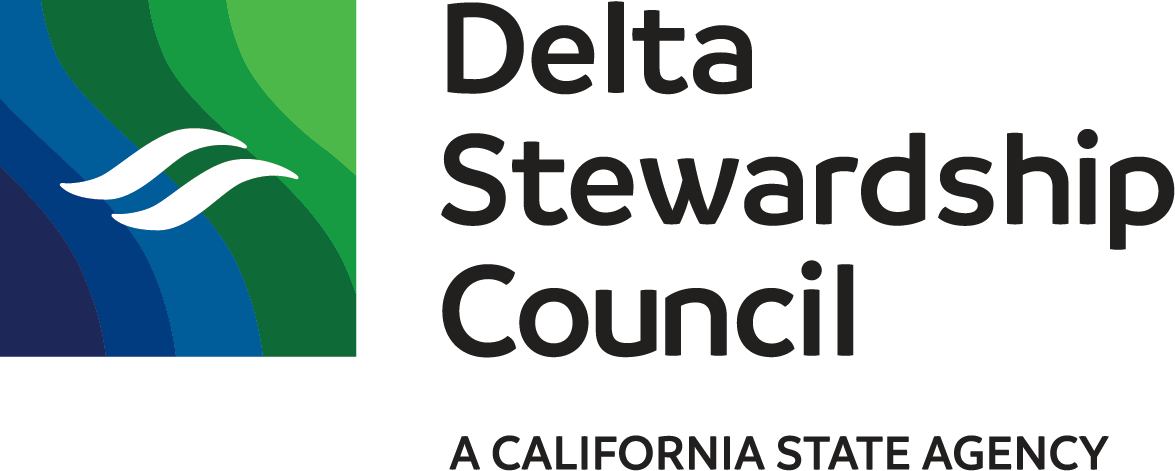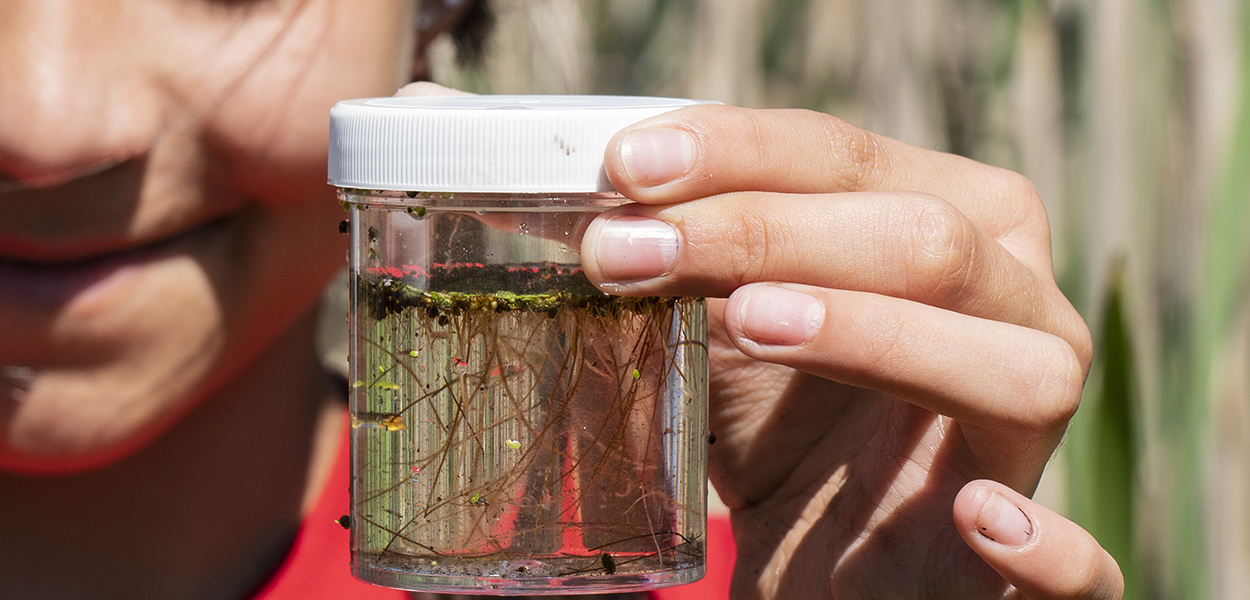
From Carbon, to Communities, and the Classroom: Extending the Impact of Research Beyond the Science Itself
July 31, 2023
By Senior Environmental Scientist for Science Communication Lynn Takata and Program Manager for the Adaptive Management Unit Dr. Dylan Chapple
On a warm spring morning, sixty students from Knightsen Elementary School spill from school buses at the California Department of Water Resources’ newly restored Dutch Slough tidal marsh near Oakley in eastern Contra Costa County, and gather around U.C. Berkeley scientist Dr. Dennis Baldocchi and his colleagues. Today, the students won’t just learn about the historical ecology of the Sacramento San-Joaquin Delta from the experts. They’ll get to observe science in action as a working tower of scientific instruments measures greenhouse gasses moving between the wetland and the atmosphere. They’ll see tracks left by a river otter crossing the berm between a canal and the tules. They’ll dig into the peat soil with their own hands, experiencing this ecosystem in vivid detail.
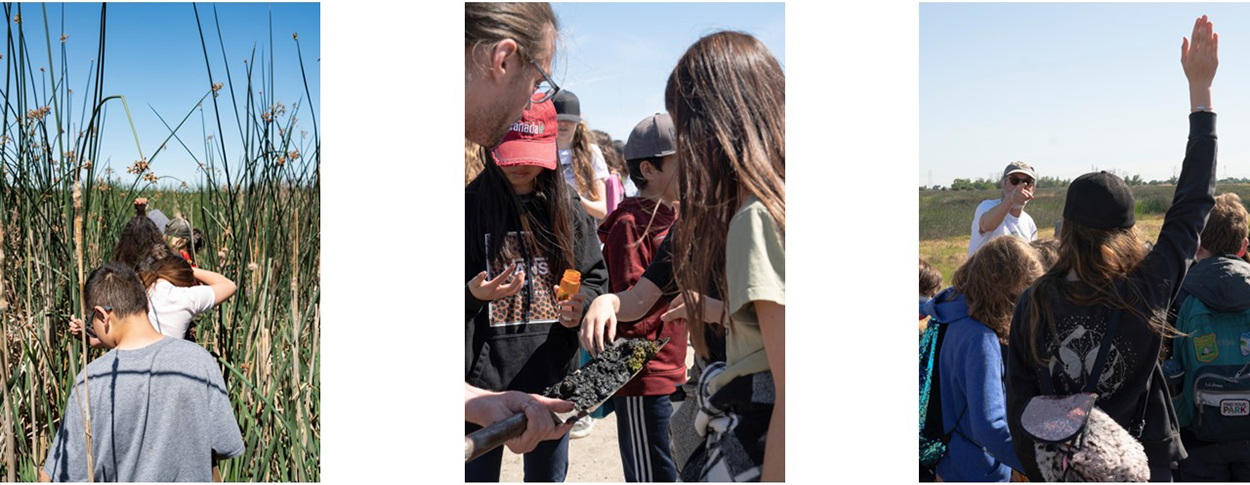
On this field trip, these local students get to explore their own ecological backyard, much as Dr. Baldocchi did as a child. He grew up just a few miles away on the family’s orchard, catching fish in Marsh Creek, now connected to Dutch Slough. Hands-on experiences like these can cultivate an appreciation and curiosity for the Delta in these students.
The nearly 2,000 acres of marshland at Dutch Slough promises better habitat and food resources for native species, and the Baldocchi Lab’s research there will improve our understanding of how Delta wetlands balance greenhouse gas storage and emissions. In fact, early results indicate that these wetlands may be storing carbon faster than almost any other studied ecosystem on the planet. But the work isn’t just about the science. Dr. Baldocchi and his colleagues are paying it forward to the local community and cultivating future scientists who can continue to search for solutions to climate change.

Dr. Baldocchi’s broader impact footprint will also reverberate through time. Thus far, he’s mentored dozens of scientists who work to address climate change. Former postdoctoral scholar Ariane Arias-Ortis (now a professor at Universitat Autònoma de Barcelona) and Ph.D. student Robert Shott study Dutch Slough as part of their research on carbon storage dynamics in wetlands and agricultural lands. Former lab members and affiliates have become distinguished Delta scientists in their own right: Dr. Patty Oikawa, now at CSU East Bay, and Iryna Drovona, at U.C. Berkeley, recently developed a tool that can estimate greenhouse gas budgets for different kinds of wetlands in the Delta. Former undergraduate researcher Katrina Cone is bringing her experience to the public sector as a field technician for the U.S. Geological Survey, and former lab member Dr. Cove Sturtevant is now applying lessons learned to the National Science Foundation’s National Ecological Observation Network. Many of these mentees go on to train others, paying exponential dividends down the road. For the youngsters visiting from Knightsen Elementary, interacting with real scientists through the wonders of Dutch Slough may spark the idea that they, too, could be scientists one day.
Of course, the research itself will address key science and management questions. Data produced at the site will help determine how much carbon can be stored, reduced, or avoided in freshwater wetland restoration projects and how they can contribute to California’s climate change goals. Dutch Slough will provide insights on how other tidal wetland restoration projects might be designed to maximize multiple conservation benefits, including greenhouse gas mitigation, habitat creation, and sea level rise adaptation. By funding this and other research projects with broader impacts, the Delta Science Program strives to provide actionable science in service of the communities that use the Delta and call it home.
About the Authors
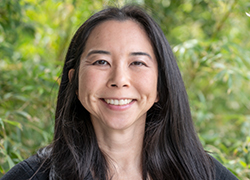
Lynn Takata
Lynn Takata is a senior environmental scientist at the Delta Stewardship Council, where she supports science communication efforts. Prior to joining the Council in 2020, she spent more than ten years working in the Delta on fisheries research and science coordination with the California Department of Water Resources and the Interagency Ecological Program. Lynn received a Master of Science in Marine, Estuarine, and Environmental Science at the University of Maryland, and a Bachelor of Science at U.C. San Diego. When she's not working, Lynn loves photography and exploring the great outdoors.
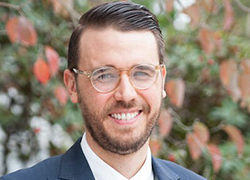
Dylan Chapple
Dr. Dylan Chapple leads the Delta Stewardship Council's Adaptive Management Unit as a program manager. Prior to this role, Dylan worked as a senior environmental scientist at the Delta Stewardship Council, focusing on science support for restoration projects, adaptive management, climate change, and science coordination. He has also served as a California Council on Science & Technology policy fellow in the California legislature and worked with the non-profit groups Save the Bay and Point Blue Conservation Science. Dylan holds a Bachelor of Arts in Environmental Studies from U.C. Santa Cruz and a Ph.D. in Environmental Science, Policy, and Management from U.C. Berkeley. His graduate research focused on tidal wetland restoration and climate in the San Francisco Bay.

